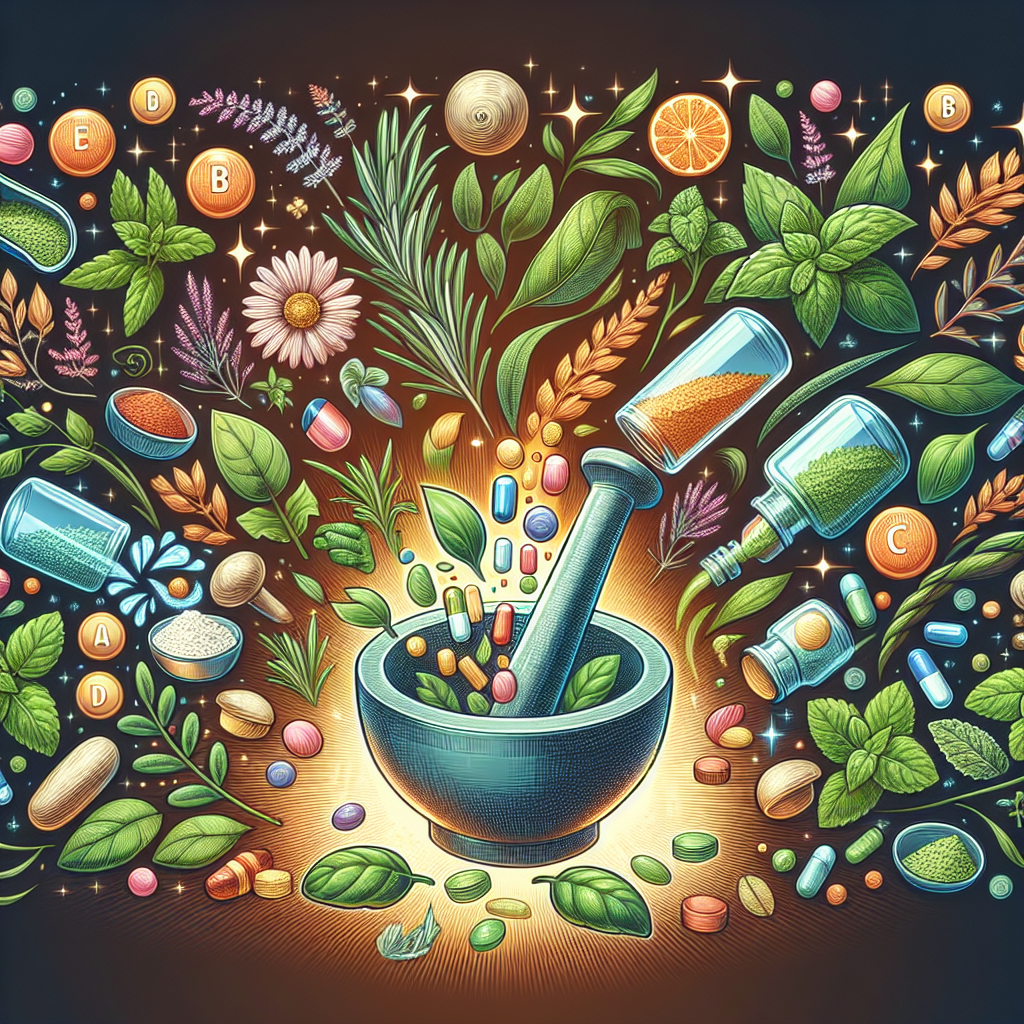Combining Herbs and Vitamins for Optimal Health

Discover the power of combining herbs and vitamins for optimal health. Learn more about this natural approach to wellness and how it can enhance your vitality. Click here to start your journey towards a healthier you.
Maximizing Wellness: The Power of Combining Herbs and Vitamins
The pursuit of optimal health is a journey that requires a comprehensive approach, encompassing not only regular exercise and a balanced diet but also the strategic use of herbs and vitamins. The power of combining herbs and vitamins lies in their ability to complement each other, enhancing the overall effectiveness of each component and maximizing wellness.
Herbs have been used for centuries in traditional medicine, offering a natural and holistic approach to health. They are rich in phytochemicals, compounds that have been shown to have numerous health benefits, including anti-inflammatory, antioxidant, and anti-cancer properties. Herbs such as turmeric, ginger, and garlic, for instance, are renowned for their medicinal properties and can be easily incorporated into the diet.
On the other hand, vitamins are essential nutrients that the body needs to function properly. They play crucial roles in various bodily functions, including energy production, immune function, and bone health. Vitamins can be obtained from a variety of sources, including fruits, vegetables, and fortified foods. However, due to factors such as poor diet, stress, and aging, many people do not get enough vitamins from their diet and may benefit from supplementation.
When herbs and vitamins are combined, they can create a powerful synergy that enhances their individual benefits. For example, the combination of turmeric and black pepper has been shown to increase the absorption of curcumin, the active ingredient in turmeric, by up to 2000%. Similarly, combining vitamin C with iron can enhance iron absorption, helping to prevent iron deficiency anemia.
However, it’s important to note that not all herbs and vitamins can be combined safely. Some combinations can interact negatively, leading to adverse effects or reducing the effectiveness of one or both components. For instance, St. John’s Wort, a popular herb used for depression, can interfere with the effectiveness of birth control pills, heart medications, and certain antidepressants. Therefore, it’s crucial to consult with a healthcare professional before starting any new supplement regimen.
Moreover, the quality of the herbs and vitamins used is also of paramount importance. Not all supplements are created equal, and some may contain fillers, additives, or contaminants that can detract from their health benefits. Therefore, it’s advisable to choose high-quality, reputable brands that adhere to strict manufacturing standards.
In conclusion, the combination of herbs and vitamins can be a powerful tool in the quest for optimal health. By harnessing the unique benefits of each, it’s possible to enhance overall wellness and address specific health concerns. However, it’s essential to use these supplements wisely, taking into account potential interactions and the quality of the products used. With the right approach, the power of combining herbs and vitamins can be harnessed to promote health and wellbeing.
The Synergy of Herbs and Vitamins: A Pathway to Optimal Health

The pursuit of optimal health is a journey that requires a comprehensive approach, encompassing not only regular exercise and a balanced diet but also the strategic use of herbs and vitamins. The synergy of herbs and vitamins can be a powerful tool in achieving and maintaining optimal health. This combination can provide a plethora of benefits, from boosting the immune system to enhancing mental clarity, and even slowing down the aging process.
Herbs have been used for centuries in traditional medicine systems across the globe. They are rich in phytochemicals, compounds that have been shown to have numerous health benefits. For instance, turmeric, a staple in Indian cuisine and Ayurvedic medicine, contains curcumin, a potent anti-inflammatory and antioxidant compound. Similarly, ginseng, a cornerstone of traditional Chinese medicine, is renowned for its ability to boost energy levels, lower blood sugar, and improve mental function.
Vitamins, on the other hand, are essential nutrients that our bodies need to function properly. They play crucial roles in various physiological processes, from converting food into energy to repairing cellular damage. For example, vitamin C is a powerful antioxidant that can boost the immune system, while vitamin B12 is essential for nerve function and the production of red blood cells.
When herbs and vitamins are combined, they can work synergistically to enhance each other’s effects. This is because the active compounds in herbs can often enhance the absorption and efficacy of vitamins. For instance, the curcumin in turmeric can enhance the absorption of vitamin B6, while the ginsenosides in ginseng can enhance the effects of vitamin C.
Moreover, the combination of herbs and vitamins can provide a more holistic approach to health. While modern medicine often focuses on treating specific symptoms or diseases, the synergy of herbs and vitamins can help to promote overall health and wellbeing. This is because herbs and vitamins can target multiple pathways in the body, from boosting the immune system to reducing inflammation and oxidative stress.
However, it’s important to note that not all herbs and vitamins are created equal. The quality, purity, and potency of these substances can vary widely, and some may even contain harmful contaminants. Therefore, it’s crucial to choose high-quality, reputable products. It’s also important to consult with a healthcare professional before starting any new supplement regimen, as some herbs and vitamins can interact with medications or have side effects.
In conclusion, the synergy of herbs and vitamins can be a powerful tool in the pursuit of optimal health. By combining these natural substances, we can harness their individual benefits and enhance their effects, providing a comprehensive approach to health and wellbeing. However, it’s crucial to choose high-quality products and consult with a healthcare professional to ensure safety and efficacy. With the right approach, the combination of herbs and vitamins can help us to achieve and maintain optimal health, enhancing our quality of life and wellbeing.
Unlocking Health Benefits: The Art of Mixing Herbs and Vitamins
The pursuit of optimal health is a journey that often leads us down the path of exploring various dietary supplements. Among these, herbs and vitamins have long been recognized for their potential to enhance our wellbeing. However, the art of combining these two powerful health allies is a less explored territory that holds immense promise.
Herbs, with their rich array of phytochemicals, have been used for centuries in traditional medicine systems across the world. They offer a plethora of health benefits, from boosting immunity to improving digestion and promoting heart health. On the other hand, vitamins, essential nutrients that our bodies cannot produce in sufficient quantities, play a crucial role in maintaining our overall health. They aid in various bodily functions, including energy production, immune function, and bone health.
The combination of herbs and vitamins can create a synergistic effect, enhancing the health benefits of each. This synergy can be harnessed to address specific health concerns or to promote overall wellbeing. For instance, combining vitamin C with echinacea, a herb known for its immune-boosting properties, can provide a potent defense against common colds and flu. Similarly, pairing vitamin D with the herb St. John’s Wort could potentially enhance mood and support mental health.
However, the art of mixing herbs and vitamins is not as simple as randomly pairing them. It requires a deep understanding of the properties of each herb and vitamin, their interactions, and the specific health needs they can address. For instance, while vitamin C enhances the absorption of iron, it can interfere with the absorption of vitamin B12. Therefore, these vitamins should not be taken together. Similarly, certain herbs can interact with vitamins or other medications, leading to undesirable effects.
To safely and effectively combine herbs and vitamins, it is essential to consult with a healthcare professional or a certified herbalist. They can provide guidance on the appropriate combinations, dosages, and timing for taking these supplements. Additionally, they can help identify any potential interactions with other medications or health conditions.
Moreover, it is crucial to source high-quality herbs and vitamins. The market is flooded with dietary supplements, but not all are created equal. Look for products that are certified organic, non-GMO, and free from fillers and additives. Also, consider the form of the supplement. While some vitamins are best absorbed in their natural form, others may be more bioavailable in a synthetic form. Similarly, some herbs are most potent when used fresh, while others may be more effective as dried extracts.
In conclusion, the art of combining herbs and vitamins holds great potential for enhancing our health and wellbeing. By understanding the properties of these supplements, consulting with healthcare professionals, and sourcing high-quality products, we can unlock the full potential of this powerful health alliance. However, it is important to remember that supplements are not a substitute for a balanced diet and healthy lifestyle. They should be used as part of a holistic approach to health that includes a nutritious diet, regular exercise, adequate sleep, and stress management.